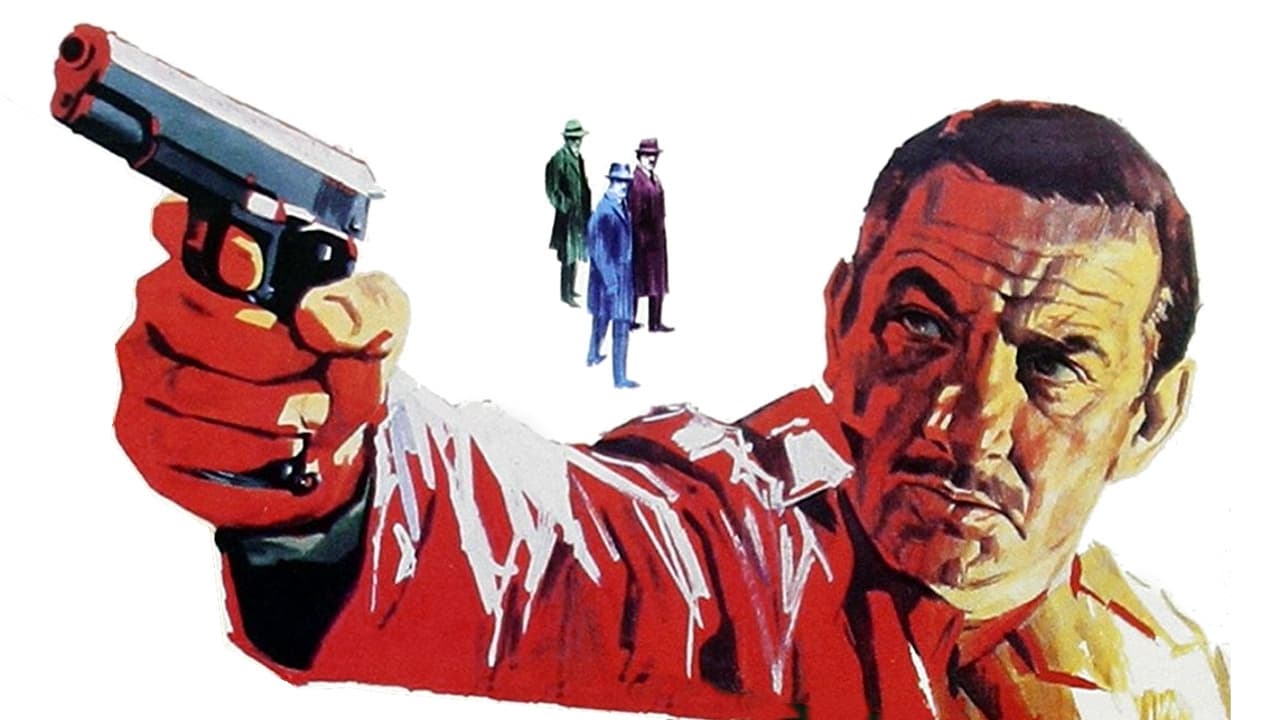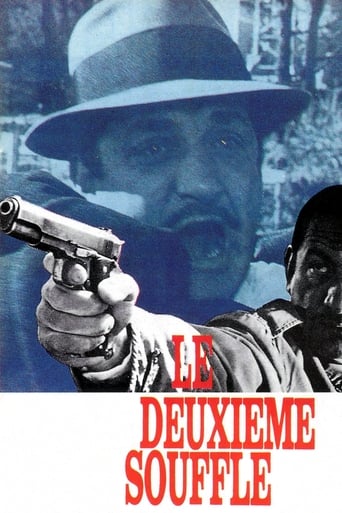

I'll start with a quote from Alphonse Boudard, regarding the tendency to make crime films like Greek tragedy: Melville wants to remake the Atreidae among criminals. He means that these stories of desperate men settling scores between themselves in the bloodiest fashion possible (I lost count of the corpses in this picture) can't carry the weight of classical tragedy. The excessive length of the film (Le Samourai clocks in at 100 minutes, Un flic at 94--these stories are not much less complicated than Deuxieme souffle), means there must be scenes that drag on, until the dramatic effect is totally lost. The platinum heist seems to last forever, and it is meant to be the one big suspense moment.The actors don't do well in general. Pierre Zimmer, playing Orloff, is given silly lines about what he has to do with Gu, if there's betrayal, but he comes off so stiff you want to fast-forward through his scenes. Lino Ventura acts well, has lots of charisma, but looks old--and his age is commented on by the younger thugs. Christine Fabrega is so terribly stiff and sculptural, you wonder how she was hired to play Manouche. It seems Simone Signoret was intended for the part, but dropped out--a great pity. Signoret would have delivered the vitality and strength that are so conspicuously lacking in Fabrega. There's only one stand-out performance: Paul Meurisse is so elegant and smart as Blot that the story takes off every time he comes into the frame. If you have seen Les Diaboliques, you'll know how good he is.The camera work is mediocre; a washed-out b/w that looks more like television than Melville's great pictures of the 50's. Le deuxieme soufflé is one of the lower points in this man's output.
... View MoreWhat I find is that a great film of great length, whether slow paced or not, is life a sheep in wolf's clothing. However intimidating a run time may look, the greats go by quicker than many 90 minute efforts. Whether it's Solaris(1972) and Andrei Rubev(1966) in just short o9f 3 hours, or Seven Samurai(1954) and Godfather II(1974) in excess of 200 minutes, there films to me never feel their length and always justify it. While many have commented on "Second Wind" (using the English title for simplicity's sake) running time, rest assured, it too is deceptive.The film opens abruptly into the finale of an escape sequence from prison, giving no breathing room as you are thrown into the action. One man dies but the other two make it out, as we go to an atmospheric opening credits sequence of the two running through the forest, with little to no music. Only one of the escapees is of concern to us, Gustave Minda (regularly called Gu), put behind bars for a train robbery gone wrong. He comes back to his old stomping grounds, rescuing his sister and loyal friend from a pair of thugs. Their murder further brings heat down on him in a case led by Blot, a wise cracking but crafty inspector. Many plot points are running intersect, including a battle over the cigarette business and the forming of a heist, the latter of which Gu is drawn into in order to have some money when he leaves the country. While there are a lot of characters and going ons to keep track of, as long as one is paying attention, following along is simple, as Melville masterfully brings these plot points together.This is a dialogue and character heavy movie, making it more similar to "Bob the Gambler" (1955) than "Le Samurai(1967). While maybe not as snappy as Godard, or Tarantino for a more modern example, Melville's films were always strong in dialogue, and this is no exception. This movie is composed of a string of home running scenes. Whether it's humorous, like inspector Blot's sarcastic rant on the unwillingness of a restaurant's employees and customers to comment on the shooting that had occurred, or serious, such as a trio of gangsters confronting a man they believe set them up, there are no wasted scenes or dull moments, whether five minutes or twenty. There's nothing here story wise that is of particularly new ground: a noir style fatalism, a police force as corrupt as the criminals they pursue, political intrigue and betrayals, however it doesn't matter. Originality is welcome but not necessary in anything, and here we see these familiar threads executed with such enthusiasm, backed by strong performances all around, that it hardly matters whether one has seen these things before. If there is one possibly original aspect, it is in it's ending which I won't spoil here. It's a small, but important moment, and much like his follow up "Le Samurai"(1967), widely open to interpretation.Melville is known for his awesome visuals and mood, and this is no exception. His love of noir is apparent in the perfectly dark lighting, combined with an often minimal soundtrack that aids in creating a mood of dread in many scenes. This is actually a much more subdued effort for Melville in that regard, but it works here as the focus is much more on story and characters.Not to be missed for fans of crime films.
... View More"Le Deuxième Soufflé" is an excellent crime film--mostly because it emphasizes realism as opposed to sensationalism. Now this isn't to say the film isn't exciting, but it certainly is one that has a much slower pace than usual and excessive attention is paid to the details--so much that you'd swear this is almost a crime documentary instead of fiction.The film begins with a daring breakout from prison. Gustave 'Gu' Minda is lucky and makes it over the wall safely. It turns out he was #1 on France's most wanted list ten years earlier and so naturally it makes quite a sensation when he escapes. The first half of the movie have a lot to do with his escape and his life in hiding. However, despite hiding, he does have a few adventures along the way that I won't elaborate on because it would spoil the suspense.A bit later, while waiting for a way out of the country, Gu is a bit bored and jumps at a chance to pull one last job--a very, very BIG job where 800,000,000 francs worth of platinum is on the line. Once the job has been completed, though, the film is far from over and the police naturally are combing the country for Gu and the money--though they really don't know if he had anything to do with it or who his accomplices are.Now there is one minor detail about the film I didn't like. While Gu has changed his appearance and relocated from Paris to Marseilles, he sure seemed pretty out of character late in the film. Despite being such a brilliant and careful prisoner, he takes walks about the city! Why? Well, I have no idea and it's not surprising that he's finally caught. However, once again, there is much more to this 150 minute film--a lot of twists and turns that occur because Gu, though generally amoral, will do anything to convince his fellow criminals that he has a strong sense of honor and integrity. I liked this because it did give him some depth and the finale was indeed exciting.The film is very much like a French version of Film Noir. In general, the French did their Noir a bit later than Hollywood and this continued through the 1960s--after Hollywood had gone on to other things. Making this film in black and white was a great choice, as it heightened the Noir look and it as well as "Bob le Flambeur" and "Le Samourai" are among the best in this French genre. Not to be missed.
... View MoreI had seen nearly everything that is readily available from Jean-Pierre Melville in the United States by the time I got to Le Deuxieme soufflé, which may be part of why I didn't respond overwhelmingly to it. After such challenging, methodical and precisely existential crime masterpieces as Le Samourai, Le Cercle Rouge, Bob le flambeur and the underrated Le Doulos, this one just seemed to not pack the same kind of punch that the others did. Again, this may be the fault on the viewer for seeing this last among his mostly thriller-oriented oeuvre, but perhaps it's also some of Melville's fault too; again and again, as the dedicated and ruthless auteur that he was (one of the great French directors I would argue), he kept coming back to men in trench-coats with grim expressions figuring out on both sides- criminal and detective- of how to plot the next move or, for the former, how to keep from the fatalism of the plot.Which, for Melville, is something that comes second nature. The difference, perhaps, in this case is that the length (a whopping two and a half hours, longer than both The Red Circle and Army of Shadows) and the amount of details in the structure of the story (i.e. what happened on such and such a day made this happened could've been snipped, albeit I can't pinpoint to which) bog down some of the more successful aspects to the picture. Which is also to say that for all of its minor misgivings, Le Deuxieme soufflé (or, simply, The Second Breath) is near-classic Melville, with nail-bitingly tense suspense scenes like the opening escape from the prison and the latter heist sequence- somewhat more obvious and less coolly ambitious as Red Circle.There's the amazing cinematography as well, a trademark of Melville and his crew to make things gritty but smooth in precision and style, and the performances from Paul Meurisse as the Detective (maybe my favorite performance of the picture just for the intelligence he imbues in the character), and Lino Ventura as one of the quintessential Melville anti-heroes, Gu, the convict who wants in on the big 200 million heist. And even as it could be Melville's most "talky" picture after Bob le flambeur (which is relative to how pleasantly light, or how seemingly sparse, his films are with dialog), when the characters speak it's to the point of with some quotable spunk to them.There's an icy, unspoken angst in Melville's world of criminals, almost questioning but still true to the notion of the 'policier', where you'd want the criminals to get away with it if the detective wasn't so doggone determined all the time. It's another fine piece of film-making from the director, just not an all-time-top flick - more along the lines of Un flic. 8.5/10
... View More